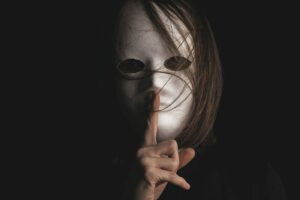From Medium/Rev. Sheri Heller, LCSW: “As I ponder how my recent move to Montreal, Canada, has ignited within me a positive visceral and emotional shift, I am reminded that distance really does afford perspective. Having extricated myself from the daily grind of NYC, I am now certain that the fears and apprehensions I routinely experienced were, in spite of media broadcasts touting renewal, a gut response to violent mayhem, vermin infestation and an obscene cost of living.
Naturally, as a complex trauma therapist of over three decades, I am compelled to mull over the psychological repercussions of nerve-wracking reality being spun as benign, even promising. Along the lines of ‘The Emperors New Clothes,’ twisted media-generated fabrications have cautioned me to consider how contemporary life, rife with false narratives and lies, is challenging all of us to collectively question if our perceptions are instinctual or delusional.
· · ·
Mistrust [is an understandable outcome of maltreatment and betrayal], especially if systemic attachment injuries rooted in childhood traumas, domestic violence, and narcissistic abuse are the cause. If severe and recurring, traumatic abuse incites one to project danger when it may not actually be present. Eventually, habitual defending against perceived victimization calcifies into paranoia.
. . . Often paranoia is a response to legitimate threats. When circumstances evidence menacing conduct and attitudes, caution and distrust are instinctual reactions arousing reasonable skepticism.
Nowadays many folks grappling with anticipatory distress and distrust are not experiencing pathological paranoia, but rather a heightened state of awareness fueled by lies, hypocrisy, censorship and expectations of blind obedience to tyrannical ideals and policies. The findings from Chapman University’s Survey on American Fears substantiate this premise, citing government corruption as America’s biggest fear (79.6%), with fear of illness and widespread civil unrest as close contenders.
With persistent fears breeding collective paranoia, polarization and corporate-state surveillance have reached dystopian heights. Taking this into account, we can surmise that present forms of oppressive social control exerted by the ruling class are representative of the benefits gleaned from the engineering and maintenance of fears in the public consciousness. After all, as economic historian Dr. Robert Higgs asserts, ‘fear is the foundation of every government’s power.’
Indeed we are all witnessing how questioning corruption and conflict in governance and media begets smear campaigns and stigma. It follows that forced conformity and cognitive dissonance result from these conditions. Moreover, when those who dare to question are cancelled, boycotted, dehumanized and ruined, obedience is ensured.
One just has to recall the plights of Daniel Hale or Julian Assange, and a litany of other whistleblowers labeled traitors or conspiracy theorists, to know what happens to those who expose the immoral political and financial interests of powerful elites.
. . . The defensive warding off of anxiety aroused by threatening, contradictory perceptions and contrary beliefs entails repressing and shunning that which threatens illusions of control and safety. However, unwanted fears do not simply go away. Rather, they go underground, not out of existence.
As French novelist/journalist Émile Zola warned, when psychic energy is used to deny what is forbidden, that which could benefit from the examination is hidden. Furthermore,
‘When truth is buried underground it grows, it chokes, it gathers such an explosive force that on the day it bursts out, it blows up everything with it.’
Zola contended, as did the founder of analytical depth psychology Carl Jung, that what is split off from consciousness on a societal level manifests as violence and oppression. Referred to by Jung as the collective shadow, humanity’s projection of what is unwanted, hidden and repressed has far-reaching, damaging implications.
. . . when we are not blindly going along with prescriptive storylines, we are left to dwell on what is real. What can be trusted?
American writer Thomas Pynchon wrote in his novel Gravity’s Rainbow, ‘If they can get you asking the wrong questions, they don’t have to worry about answers.’
Unfortunately, with the press being as corrupt as the cronies, agendas, and institutions warranting investigation, we have lost sight of the right questions. Consistently spoon-fed messaging that contradicts fact, Americans are demoralized and, yes – justifiably paranoid . . .
If we are to glean anything from our persecutory fears, let it be that we glean the benefits of distrusting that which should not be trusted . . .
With the corporate interests of the wealthy and powerful at the helm, democratic governance has dissolved and authoritarianism has taken root. Conspiracy or truth? You decide.”

***
Back to Around the Web











